Grüne Transformation
Forschung und Beratung für den Strukturwandel der deutschen Wirtschaft
Dossier, Stand: 18.06.2024

Grüne Transformation
Die grüne Transformation ist ein zentrales Thema unserer Zeit. Sie beschreibt im weiteren Sinne den umfassenden Wandel der deutschen und europäischen Wirtschaft hin zu einer nachhaltigeren, umweltfreundlicheren und zukunftsfähigeren Wirtschaftsweise. Im engeren Sinne wird grüne Transformation verstanden als ein Prozess, Energie zunehmend treibhausgasneutral zu erzeugen.
Diese Transformation ist unstrittig. Sie ist notwendig, um den Klimawandel zu bekämpfen. Und sie bietet immense Chancen für Innovation, Wachstum und die Schaffung neuer Arbeitsplätze in Deutschland - wenn sie strategisch korrekt geplant und umgesetzt wird.
Worum geht es in der grünen Transformation?
Im Kern geht es bei der grünen Transformation darum, fossile Energieträger durch erneuerbare Energien zu ersetzen, die Energieeffizienz zu steigern und eine Kreislaufwirtschaft zu etablieren.
Die grüne Transformation erfordert erhebliche Investitionen in neue Technologien und Infrastruktur ebenso wie Anpassungen in der Gesetzgebung und Regulierung. Unternehmen müssen ihre Produktionsprozesse umstellen, neue Geschäftsmodelle entwickeln und nachhaltige Produkte und Dienstleistungen anbieten.
Die wirtschaftswissenschaftliche Forschung und Beratung begleitet dabei einerseits Bereiche, die im Zuge der grünen Transformation negativ betroffen sind, wie beispielsweise die deutschen Kohlereviere, die hierfür Mittel für Stukturänderungen erhalten. Andererseits befasst sich die wirtschaftswissenschaftliche Forschung mit Wirtschaftsbereichen, die im Wachsen begriffen sind, beispielsweise Digitalisierung und Robotik.
Rolle des IWH bei der grünen Transformation
Dieser Strukturwandel betrifft alle Bereiche der Wirtschaft, von der Industrie über den Dienstleistungssektor bis hin zur Landwirtschaft. So stehen insbesondere die energieintensiven Branchen vor der Herausforderung, ihre Emissionen drastisch zu reduzieren und gleichzeitig wettbewerbsfähig zu bleiben.
Gefragt sind für diesen Strukturwandel innovative Ansätze und eine enge Zusammenarbeit zwischen Wirtschaft, Wissenschaft und Politik. Das Leibniz-Institut für Wirtschaftsforschung Halle (IWH) stellt sich dieser Aufgabe und positioniert sich an dieser Schnittstelle mit seiner Forschung und Beratung.
Die Wissenschaftlerinnen und Wissenschaftler des Hauses analysieren unter anderem die ökonomischen Auswirkungen der grünen Transformation, bewerten die Wirksamkeit politischer Maßnahmen und liefern wichtige Erkenntnisse für die Gestaltung von Förderprogrammen und Regulierungen. Durch fundierte Analysen und Prognosen tragen sie dazu bei, die Herausforderungen des Strukturwandels zu meistern und die Potenziale optimal zu nutzen.
Dies alles erfolgt eingebettet in einen europäischen und internationalen Rahmen: Durch vernetzte Forschungsprojekte, Konferenzteilnahmen und den Austausch von Gastwissenschaftlerinnen und Gastwissenschaftlern liegen Forschung und Beratung durch das IWH auf der Höhe der Zeit. Sie werden mit anderen Schwerpunktthemen des Hauses verknüpft, darunter Konjunktur, Finanzstabilität, Produktivität und Demographie.
Die europäische Dimension der grünen Transformation
Die grüne Transformation bietet die Chance, Deutschland erfolgreich im Bereich Nachhaltigkeit und Innovation zu positionieren. Durch die Entwicklung und den Export von grünen Technologien und Lösungen kann die deutsche Wirtschaft nicht nur ökologisch, sondern auch ökonomisch profitieren.
Damit dies gelingt, kann Deutschland hier jedoch keinen wirtschaftlichen Sonderweg gehen, sondern sollte wie in allen anderen Bereichen auch europäisch abgestimmt vorgehen. Zudem plädiert das IWH für die Regelung durch die Märkte.
Die Europäische Union (EU) und Preisanreize sind mithin nach Einschätzung des IWH die wichtigsten Treiber für die grüne Transformation. Um die Akzeptanz in der Bevölkerung zu erhöhen, sollte dort CO2 eingespart werden, wo dies am kostengünstigsten innerhalb der EU möglich ist.
Energieerzeugung und -verbrauch sollten daher nicht kleinteilig reguliert werden, schreiben Reint Gropp und Oliver Holtemöller, Präsident und Vizepräsident des IWH, daher in einem am 18.06.2024 veröffentlichten Strategiepapier Sechs Punkte für eine effiziente grüne Transformation. Darin empfehlen die Autoren aufeinander abgestimmte Punkte zur grünen Transformation, die nur als Paket wirksam sind.
Reint Gropp und Oliver Holtemöller: "Ein Plan zur grünen Transformation" (Gastbeitrag)
in: Frankfurter Allgemeine Zeitung, 17.06.2024
Oliver Holtemöller: "BASF kehrt Deutschland den Rücken? Ökonomen fordern Reaktion der Ampelregierung"
in: Berliner Zeitung, 31.05.2024
Oliver Holtemöller: "Die Spur der Kohlemilliarden": MDR-Langfristprojekt verfolgt in Echtzeit, wohin Investitionen fließen
in: Mitteldeutscher Rundfunk, 30.11.2023
Oliver Holtemöller: "Wohin fließen die Kohlemilliarden?"
in: Mitteldeutscher Rundfunk, 28.11.2023
IWH: "Von Aktivismus bis zur Kohle: Vielfältiges MDR-Programm zur Weltklimakonferenz 2023 Hauptinhalt"
in: Mitteldeutscher Rundfunk, 24.11.2023
Oliver Holtemöller: "Wirksamkeit der Strukturförderung: Wohin gehen die 'Kohlemilliarden'?" (Podcast-Interview)
in: revierwende.de, 15.11.2023
IWH: "Wie weit ist der Strukturwandel in Deutschlands Kohlerevieren?"
in: rbb Rundfunk Berlin-Brandenburg, 09.11.2023
Oliver Holtemöller: "IWH-Bericht über Verwendung von Milliarden aus dem Kohleausstieg" (ab Min. 14:00)
in: ARD tagesschau, 18.08.2023
IWH: "Bund stellt Milliardenhilfen für Kohle-Regionen zur Verfügung, doch die werden kaum genutzt"
in: TAG24.de, 17.08.2023
IWH: "Kohleausstieg: Fördermittel nur zu «kleinem Teil» abgerufen"
in: FAZ.net, 16.08.2023
IWH: "Kohleausstieg: Fördermittel nur zu "kleinem Teil" abgerufen"
in: Zeit Online, 16.08.2023
IWH: "Gutachten zu Kohlemilliarden: Mehr Mittel in Verfügbarkeit von Arbeitskräften lenken"
in: Sächsische.de, 16.08.2023
Oliver Holtemöller: "Kohleausstieg - Ein gerettetes Dorf will eine Zukunft" (Bericht ab Min 11:44)
in: Bundeszentrale für politische Bildung, 06.06.2023
IWH: "IWH startet Studie zur Wirkung der "Kohlemilliarden"
in: Zeit Online, 15.12.2022
Steffen Müller: "Was passiert mit Deutschlands Industrie bei einem Gasmangel?"
in: Spiegel Online, 12.11.2022
Reint Gropp: "Strukturhilfen für Braunkohleregionen: Notwendiger Umbau"
in: taz.de, 07.10.2022
Oliver Holtemöller: "IWH-Studie zum Kohleausstieg: Ohne Abwanderung von Arbeitskräften wird der Strukturwandel nicht vonstattengehen"
in: Leipziger Internet Zeitung, 18.08.2022
Medienkooperation
In Deutschlands Braunkohlerevieren werden bis 2038 40 Milliarden Euro Steuergelder investiert. Wer profitiert von dem Geld? Und geht die Investition auf?
IWH-Fachberatung im Rahmen des Projekts "Die Spur der Kohlemilliarden" des Mitteldeutschen Rundfunks (MDR) und der Hoferichter & Jacobs GmbH.
Ausgewählte Veröffentlichungen
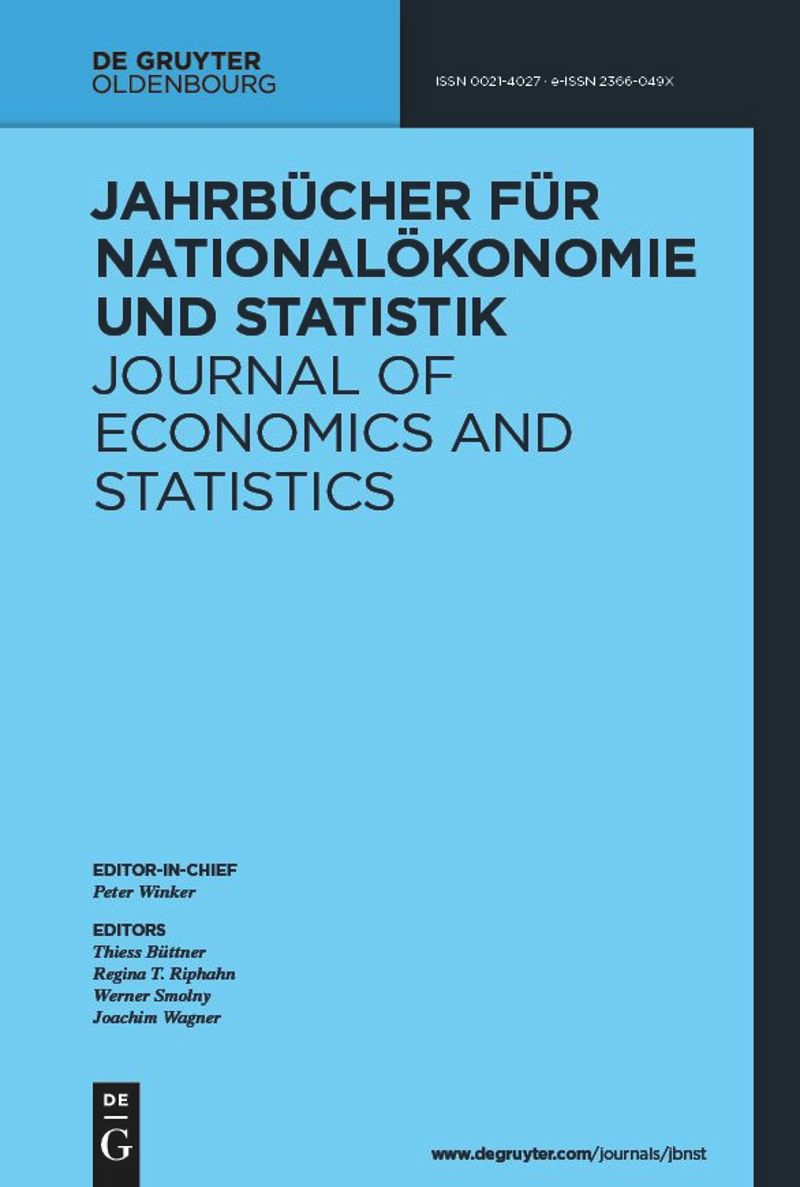
Robot Adoption at German Plants
in: Jahrbücher für Nationalökonomie und Statistik, Nr. 3, 2024
Abstract
<p>Using a newly collected dataset at the plant level from 2014 to 2018, we provide the first microscopic portrait of robotization in Germany and study the correlates of robot adoption. Our descriptive analysis uncovers five stylized facts: (1) Robot use is relatively rare. (2) The distribution of robots is highly skewed. (3) New robot adopters contribute substantially to the recent robotization. (4) Robot users are exceptional. (5) Heterogeneity in robot types matters. Our regression results further suggest plant size, high-skilled labor share, exporter status, and labor shortage to be strongly associated with the future probability of robot adoption.</p>
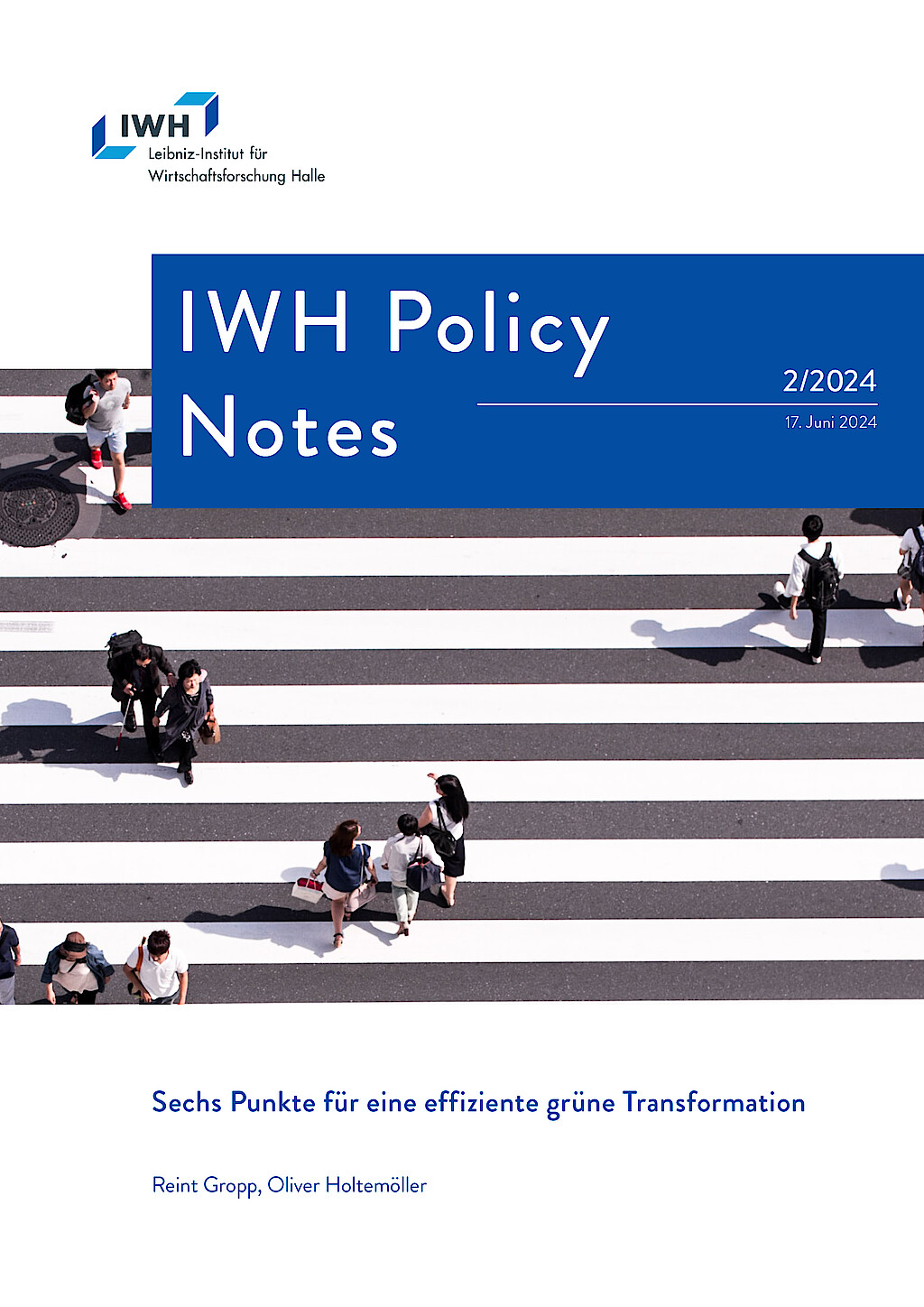
Sechs Punkte für eine effiziente grüne Transformation
in: IWH Policy Notes, Nr. 2, 2024
Abstract
<p>Die grüne Transformation, verstanden als ein Prozess, Energie zunehmend treibhausgasneutral zu erzeugen, kann mit marktwirtschaftlichen Instrumenten und dafür erforderlichen Rahmenbedingungen kostengünstiger umgesetzt werden als mit staatlicher Steuerung des Energieverbrauchs und der Energieerzeugung. Kosteneffizienz ist von entscheidender Bedeutung für die Bereitschaft und Fähigkeit der Bevölkerung, die Lasten der Transformation zu tragen, und für eine gerechte Verteilung der Lasten.</p>
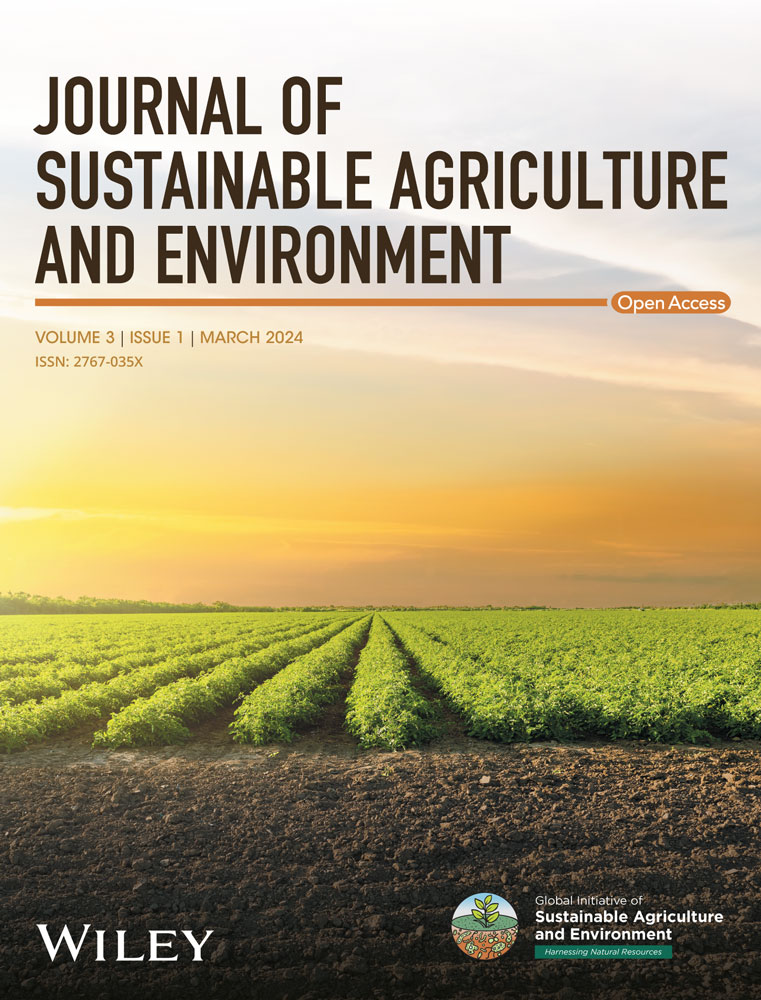
A Belowground Perspective on the Nexus between Biodiversity Change, Climate Change, and Human Well-being
in: Journal of Sustainable Agriculture and Environment, Nr. 2, 2024
Abstract
<p>Soil is central to the complex interplay among biodiversity, climate, and society. This paper examines the interconnectedness of soil biodiversity, climate change, and societal impacts, emphasizing the urgent need for integrated solutions. Human-induced biodiversity loss and climate change intensify environmental degradation, threatening human well-being. Soils, rich in biodiversity and vital for ecosystem function regulation, are highly vulnerable to these pressures, affecting nutrient cycling, soil fertility, and resilience. Soil also crucially regulates climate, influencing energy, water cycles, and carbon storage. Yet, climate change poses significant challenges to soil health and carbon dynamics, amplifying global warming. Integrated approaches are essential, including sustainable land management, policy interventions, technological innovations, and societal engagement. Practices like agroforestry and organic farming improve soil health and mitigate climate impacts. Effective policies and governance are crucial for promoting sustainable practices and soil conservation. Recent technologies aid in monitoring soil biodiversity and implementing sustainable land management. Societal engagement, through education and collective action, is vital for environmental stewardship. By prioritizing interdisciplinary research and addressing key frontiers, scientists can advance understanding of the soil biodiversity–climate change–society nexus, informing strategies for environmental sustainability and social equity.</p>

Too Poor to Be Green? The Effects of Wealth on the Residential Heating Transformation
in: SSRN Working Paper, 2024
Abstract
<p>Using the near-universe of Danish owner-occupied residential houses, we show that an exogenous increase in wealth significantly increases the likelihood to switch to green heating. We estimate an elasticity of one at the median of the wealth distribution, i.e., a 10% increase in wealth increase raises green heating adoption by 10%. Effects are heterogeneous along the wealth distribution: all else equal, a redistribution of wealth from rich households to poor households can significantly increase green heating adoption. We further explore potential channels of our findings (pro-social preferences, financial constraints, and luxury goods interpretation). Our results emphasize the role of economic growth for the green transition.</p>
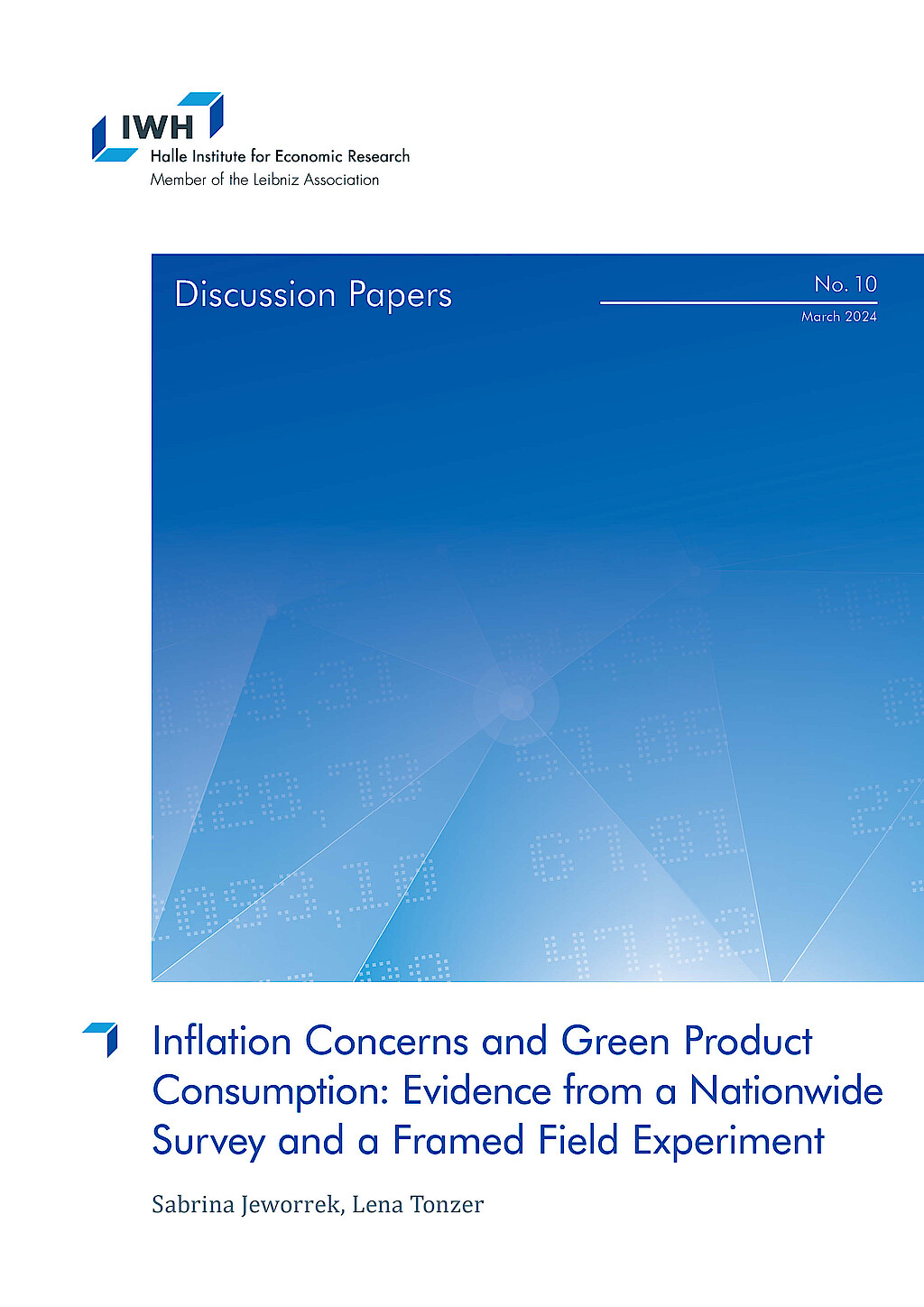
Inflation Concerns and Green Product Consumption: Evidence from a Nationwide Survey and a Framed Field Experiment
in: IWH Discussion Papers, Nr. 10, 2024
Abstract
<p>Promoting green product consumption is one important element in building a sustainable society. Yet green products are usually more costly. In times of high inflation, not only budget constraints but also the fear that prices will continue to rise might dampen green product consumption and, hence, limit the effectiveness of exerted efforts to promote sustainable behaviors. To test this suggestion, we conducted a Germany-wide survey with almost 1,200 respondents, followed by a framed field experiment (N=500) to confirm causality. In the survey, respondents’ stated “green” purchasing behavior is, as to be expected, positively correlated with concerns about climate change. It is also negatively correlated with concerns about future inflation and energy costs, but after controlling for observable characteristics such as income and educational level only the correlation with concerns about future prices remains significant. This result is driven by individuals with below-median environmental attitude. In the framed field experiment, we use the priming method to manipulate the saliency of inflation concerns. Whereas sizably relaxing the budget constraint (i.e., by 50 percent) has no impact on the share of organic products in participants’ baskets, the priming significantly decreases the share of organic products for individuals with below-median environmental attitude, similar to the survey data.</p>
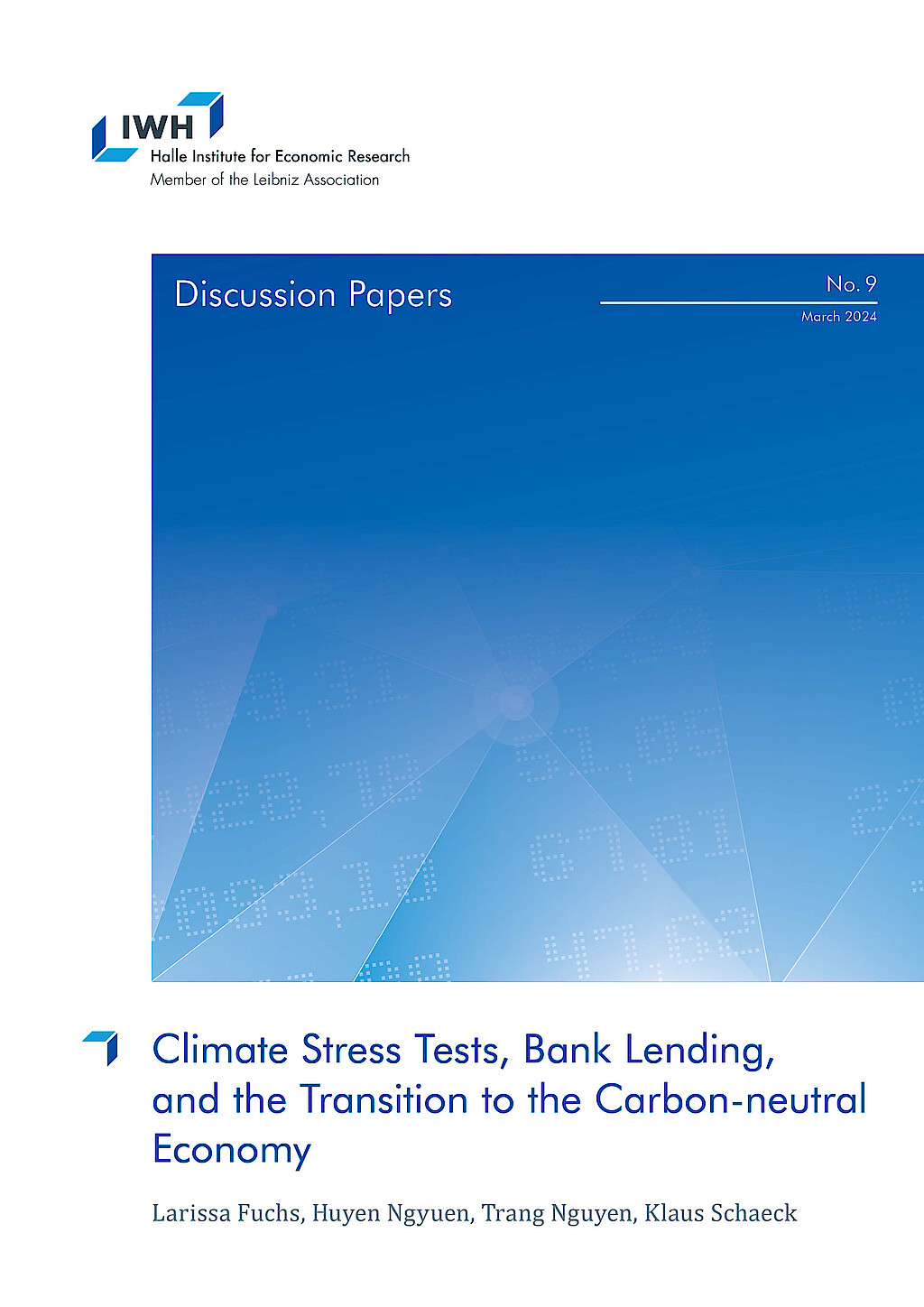
Climate Stress Tests, Bank Lending, and the Transition to the Carbon-neutral Economy
in: IWH Discussion Papers, Nr. 9, 2024
Abstract
We ask if bank supervisors’ efforts to combat climate change affect banks’ lending and their borrowers’ transition to the carbon-neutral economy. Combining information from the French supervisory agency’s climate pilot exercise with borrowers’ emission data, we first show that banks that participate in the exercise increase lending to high-carbon emitters but simultaneously charge higher interest rates. Second, participating banks collect new information about climate risks, and boost lending for green purposes. Third, receiving credit from a participating bank facilitates borrowers’ efforts to improve environmental performance. Our findings establish a hitherto undocumented link between banking supervision and the transition to net-zero.

Out of Sight, out of Mind: Divestments and the Global Reallocation of Pollutive Assets
in: SSRN Working Papers, 2023
Abstract
<p>Large emitters reduced their carbon emissions by around 11-15% after the 2015 Paris Agreement (“the Agreement”) relative to public firms that are less in the limelight. We show that this effect is predominantly driven by divestments. Large emitters are 9 p.p. more likely to divest pollutive assets in the post-Agreement period, an increase of over 75%. This divestment effect comes from asset sales and not from closures of pollutive facilities. There is no evidence for increased engagements in other emission reduction activities. Our results indicate significant global asset reallocation effects after the Agreement, shifting emissions out of the limelight.</p>

Micro Data on Robots from the IAB Establishment Panel
in: Jahrbücher für Nationalökonomie und Statistik, Nr. 3, 2023
Abstract
Micro-data on robots have been very sparse in Germany so far. Consequently, a dedicated section has been introduced in the IAB Establishment Panel 2019 that includes questions on the number and type of robots used. This article describes the background and development of the survey questions, provides information on the quality of the data, possible checks and steps of data preparation. The resulting data is aggregated on industry level and compared with the frequently used robot data by the International Federation of Robotics (IFR) which contains robot supplier information on aggregate robot stocks and deliveries.
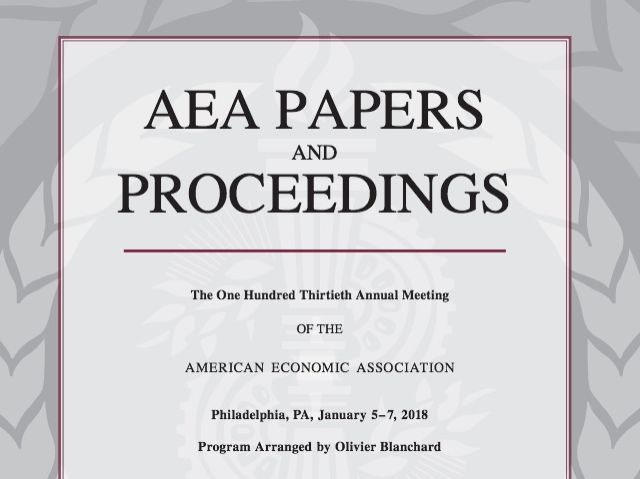
Robots and Female Employment in German Manufacturing
in: American Economic Association Papers and Proceedings, May 2023
Abstract
We analyze the impact of robot adoption on female employment. Our analysis is based on novel micro data on robot use by German manufacturing establishments linked with social security records. An event study analysis for robot adoption shows increased churning among female workers. Whereas hiring rises significantly at robot adoption, separations increase with a smaller magnitude one year later. Overall, employment effects are modestly positive and strongest for medium-qualified women. We find no adverse employment effects for female workers in any of our broad qualification groups.
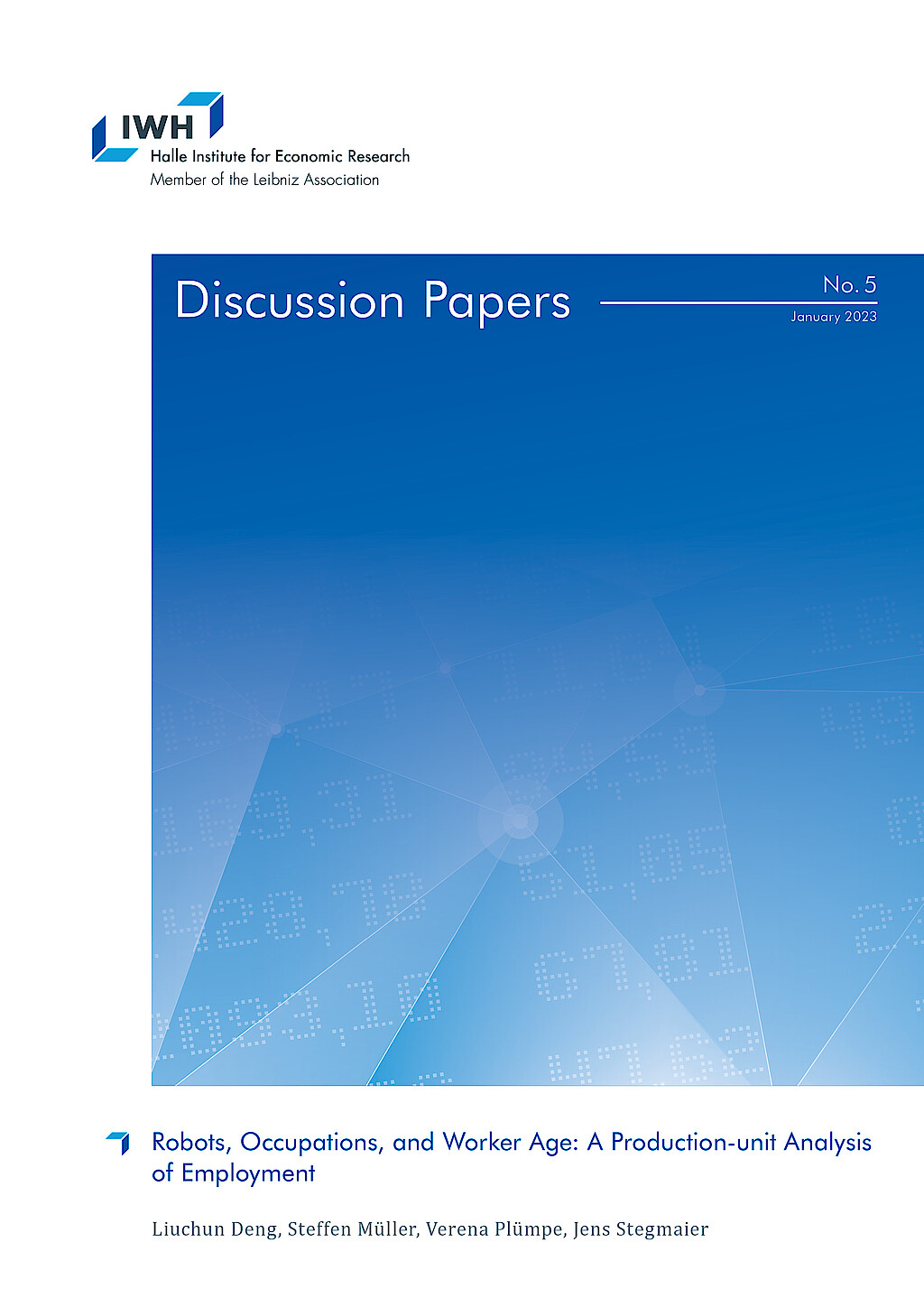
Robots, Occupations, and Worker Age: A Production-unit Analysis of Employment
in: IWH Discussion Papers, Nr. 5, 2023
Abstract
We analyse the impact of robot adoption on employment composition using novel micro data on robot use in German manufacturing plants linked with social security records and data on job tasks. Our task-based model predicts more favourable employment effects for the least routine-task intensive occupations and for young workers, with the latter being better at adapting to change. An event-study analysis of robot adoption confirms both predictions. We do not find adverse employment effects for any occupational or age group, but churning among low-skilled workers rises sharply. We conclude that the displacement effect of robots is occupation biased but age neutral, whereas the reinstatement effect is age biased and benefits young workers most.

Robot Adoption at German Plants
in: Jahrbücher für Nationalökonomie und Statistik, Nr. 3, 2024
Abstract
<p>Using a newly collected dataset at the plant level from 2014 to 2018, we provide the first microscopic portrait of robotization in Germany and study the correlates of robot adoption. Our descriptive analysis uncovers five stylized facts: (1) Robot use is relatively rare. (2) The distribution of robots is highly skewed. (3) New robot adopters contribute substantially to the recent robotization. (4) Robot users are exceptional. (5) Heterogeneity in robot types matters. Our regression results further suggest plant size, high-skilled labor share, exporter status, and labor shortage to be strongly associated with the future probability of robot adoption.</p>

Sechs Punkte für eine effiziente grüne Transformation
in: IWH Policy Notes, Nr. 2, 2024
Abstract
<p>Die grüne Transformation, verstanden als ein Prozess, Energie zunehmend treibhausgasneutral zu erzeugen, kann mit marktwirtschaftlichen Instrumenten und dafür erforderlichen Rahmenbedingungen kostengünstiger umgesetzt werden als mit staatlicher Steuerung des Energieverbrauchs und der Energieerzeugung. Kosteneffizienz ist von entscheidender Bedeutung für die Bereitschaft und Fähigkeit der Bevölkerung, die Lasten der Transformation zu tragen, und für eine gerechte Verteilung der Lasten.</p>

A Belowground Perspective on the Nexus between Biodiversity Change, Climate Change, and Human Well-being
in: Journal of Sustainable Agriculture and Environment, Nr. 2, 2024
Abstract
<p>Soil is central to the complex interplay among biodiversity, climate, and society. This paper examines the interconnectedness of soil biodiversity, climate change, and societal impacts, emphasizing the urgent need for integrated solutions. Human-induced biodiversity loss and climate change intensify environmental degradation, threatening human well-being. Soils, rich in biodiversity and vital for ecosystem function regulation, are highly vulnerable to these pressures, affecting nutrient cycling, soil fertility, and resilience. Soil also crucially regulates climate, influencing energy, water cycles, and carbon storage. Yet, climate change poses significant challenges to soil health and carbon dynamics, amplifying global warming. Integrated approaches are essential, including sustainable land management, policy interventions, technological innovations, and societal engagement. Practices like agroforestry and organic farming improve soil health and mitigate climate impacts. Effective policies and governance are crucial for promoting sustainable practices and soil conservation. Recent technologies aid in monitoring soil biodiversity and implementing sustainable land management. Societal engagement, through education and collective action, is vital for environmental stewardship. By prioritizing interdisciplinary research and addressing key frontiers, scientists can advance understanding of the soil biodiversity–climate change–society nexus, informing strategies for environmental sustainability and social equity.</p>

Too Poor to Be Green? The Effects of Wealth on the Residential Heating Transformation
in: SSRN Working Paper, 2024
Abstract
<p>Using the near-universe of Danish owner-occupied residential houses, we show that an exogenous increase in wealth significantly increases the likelihood to switch to green heating. We estimate an elasticity of one at the median of the wealth distribution, i.e., a 10% increase in wealth increase raises green heating adoption by 10%. Effects are heterogeneous along the wealth distribution: all else equal, a redistribution of wealth from rich households to poor households can significantly increase green heating adoption. We further explore potential channels of our findings (pro-social preferences, financial constraints, and luxury goods interpretation). Our results emphasize the role of economic growth for the green transition.</p>

Inflation Concerns and Green Product Consumption: Evidence from a Nationwide Survey and a Framed Field Experiment
in: IWH Discussion Papers, Nr. 10, 2024
Abstract
<p>Promoting green product consumption is one important element in building a sustainable society. Yet green products are usually more costly. In times of high inflation, not only budget constraints but also the fear that prices will continue to rise might dampen green product consumption and, hence, limit the effectiveness of exerted efforts to promote sustainable behaviors. To test this suggestion, we conducted a Germany-wide survey with almost 1,200 respondents, followed by a framed field experiment (N=500) to confirm causality. In the survey, respondents’ stated “green” purchasing behavior is, as to be expected, positively correlated with concerns about climate change. It is also negatively correlated with concerns about future inflation and energy costs, but after controlling for observable characteristics such as income and educational level only the correlation with concerns about future prices remains significant. This result is driven by individuals with below-median environmental attitude. In the framed field experiment, we use the priming method to manipulate the saliency of inflation concerns. Whereas sizably relaxing the budget constraint (i.e., by 50 percent) has no impact on the share of organic products in participants’ baskets, the priming significantly decreases the share of organic products for individuals with below-median environmental attitude, similar to the survey data.</p>

Climate Stress Tests, Bank Lending, and the Transition to the Carbon-neutral Economy
in: IWH Discussion Papers, Nr. 9, 2024
Abstract
We ask if bank supervisors’ efforts to combat climate change affect banks’ lending and their borrowers’ transition to the carbon-neutral economy. Combining information from the French supervisory agency’s climate pilot exercise with borrowers’ emission data, we first show that banks that participate in the exercise increase lending to high-carbon emitters but simultaneously charge higher interest rates. Second, participating banks collect new information about climate risks, and boost lending for green purposes. Third, receiving credit from a participating bank facilitates borrowers’ efforts to improve environmental performance. Our findings establish a hitherto undocumented link between banking supervision and the transition to net-zero.

Out of Sight, out of Mind: Divestments and the Global Reallocation of Pollutive Assets
in: SSRN Working Papers, 2023
Abstract
<p>Large emitters reduced their carbon emissions by around 11-15% after the 2015 Paris Agreement (“the Agreement”) relative to public firms that are less in the limelight. We show that this effect is predominantly driven by divestments. Large emitters are 9 p.p. more likely to divest pollutive assets in the post-Agreement period, an increase of over 75%. This divestment effect comes from asset sales and not from closures of pollutive facilities. There is no evidence for increased engagements in other emission reduction activities. Our results indicate significant global asset reallocation effects after the Agreement, shifting emissions out of the limelight.</p>

Micro Data on Robots from the IAB Establishment Panel
in: Jahrbücher für Nationalökonomie und Statistik, Nr. 3, 2023
Abstract
Micro-data on robots have been very sparse in Germany so far. Consequently, a dedicated section has been introduced in the IAB Establishment Panel 2019 that includes questions on the number and type of robots used. This article describes the background and development of the survey questions, provides information on the quality of the data, possible checks and steps of data preparation. The resulting data is aggregated on industry level and compared with the frequently used robot data by the International Federation of Robotics (IFR) which contains robot supplier information on aggregate robot stocks and deliveries.

Robots and Female Employment in German Manufacturing
in: American Economic Association Papers and Proceedings, May 2023
Abstract
We analyze the impact of robot adoption on female employment. Our analysis is based on novel micro data on robot use by German manufacturing establishments linked with social security records. An event study analysis for robot adoption shows increased churning among female workers. Whereas hiring rises significantly at robot adoption, separations increase with a smaller magnitude one year later. Overall, employment effects are modestly positive and strongest for medium-qualified women. We find no adverse employment effects for female workers in any of our broad qualification groups.

Robots, Occupations, and Worker Age: A Production-unit Analysis of Employment
in: IWH Discussion Papers, Nr. 5, 2023
Abstract
We analyse the impact of robot adoption on employment composition using novel micro data on robot use in German manufacturing plants linked with social security records and data on job tasks. Our task-based model predicts more favourable employment effects for the least routine-task intensive occupations and for young workers, with the latter being better at adapting to change. An event-study analysis of robot adoption confirms both predictions. We do not find adverse employment effects for any occupational or age group, but churning among low-skilled workers rises sharply. We conclude that the displacement effect of robots is occupation biased but age neutral, whereas the reinstatement effect is age biased and benefits young workers most.
Veranstaltungen
Begleitend zur Forschung und Berichterstattung organisiert das IWH Veranstaltungen, die den Dialog zwischen Politik, Wirtschaft und Wissenschaft fördern. Themen wie steigende Energiepreise, der Umbau der deutschen Wirtschaft und die Rolle Deutschlands im Europäischen Green Deal stehen dabei im Mittelpunkt.
Projekte
Am IWH wurden und werden verschiedene Projekte umgesetzt, die sich mit Fragen der grünen Transformation befassen. Dazu zählen:
- DFG-Antrag für das Exzellenzcluster "Breathing Nature" (Atmende Natur: Wechselwirkungen zwischen Biodiversität, Klima und menschlichem Verhalten)
- OVERHANG: Schuldenüberhang und grüne Investitionen – die Rolle von Banken für den klimafreundlichen Umgang mit emissionsintensiven Anlagenvermögen
- Evaluierung des InvKG und des Bundesprogrammes STARK
- ENTRANCES: Energy Transitions from Coal and Carbon: Effects on Societies
Unsere Experten

Präsident
Für Rückfragen stehe ich Ihnen gerne zur Verfügung.
+49 345 7753-700 Anfrage per E-Mail
Stellvertretender Präsident Abteilungsleiter
Für Rückfragen stehe ich Ihnen gerne zur Verfügung.
+49 345 7753-800 Anfrage per E-Mail
Stellvertretender Präsident Abteilungsleiter
Für Rückfragen stehe ich Ihnen gerne zur Verfügung.
+49 345 7753-727 Anfrage per E-MailAlle Experten, Pressemitteilungen, Publikationen und Veranstaltungen zum Thema "Grüne Transformation"
Publikationen zum Thema "Grüne Transformation"
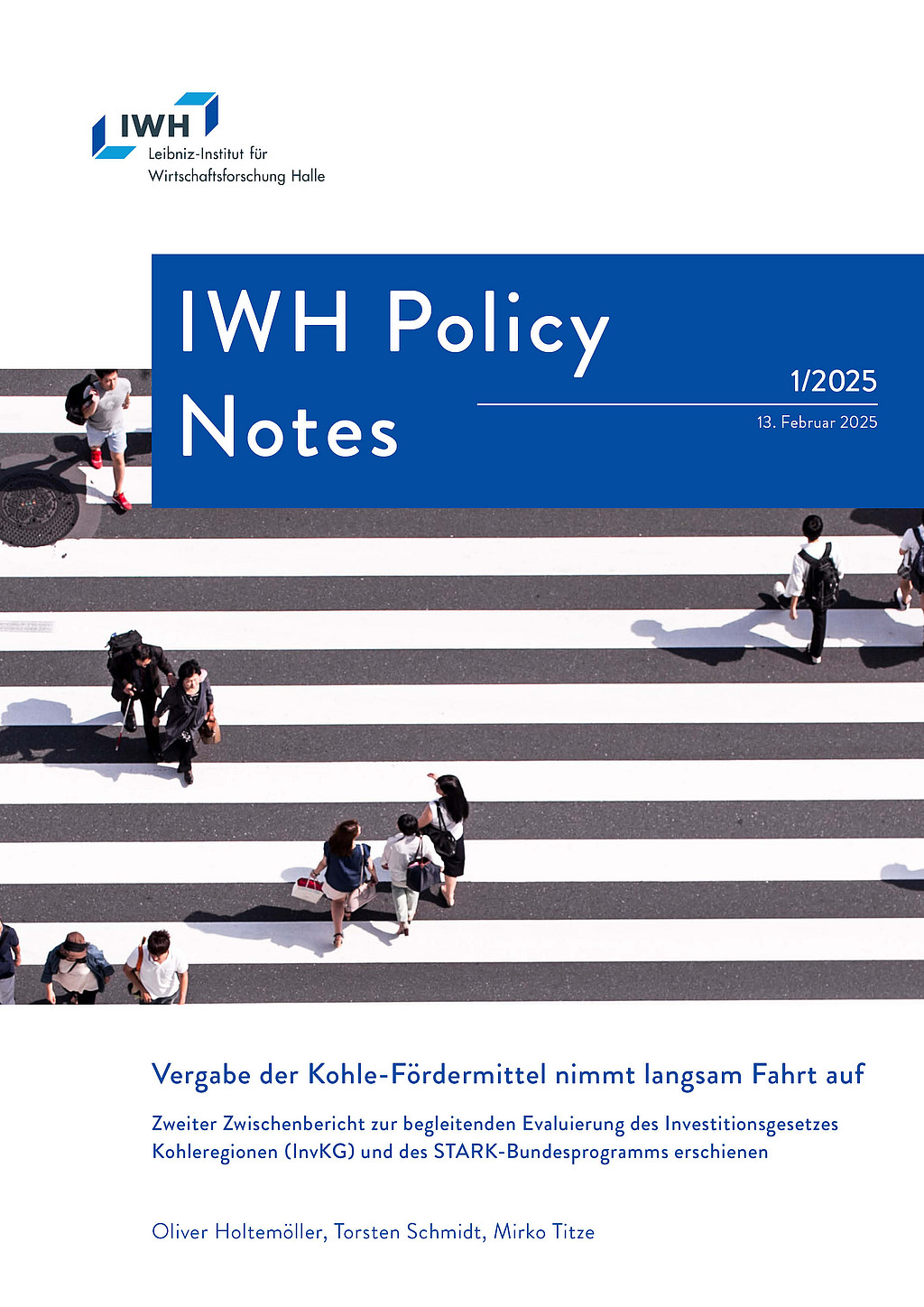
Vergabe der Kohle-Fördermittel nimmt langsam Fahrt auf - Zweiter Zwischenbericht zur begleitenden Evaluierung des Investitionsgesetzes Kohleregionen (InvKG) und des STARK-Bundesprogramms erschienen
in: IWH Policy Notes, Nr. 1, 2025
Abstract
<p>Am 13. Februar 2025 wurde der zweite Zwischenbericht zur begleitenden Evaluierung des Investitionsgesetzes Kohleregionen (InvKG) und des STARK-Bundesprogramms von den Wirtschaftsforschungsinstituten IWH und RWI veröffentlicht. </p> <p>Die Evaluierung, die im Auftrag des Bundesministeriums für Wirtschaft und Klimaschutz durchgeführt wird, analysiert die Fortschritte der Programme, identifiziert die Wirkungen der Förderung und gibt konkrete Handlungsempfehlungen, wie die Maßnahmen optimiert werden können, um die Transformation der vom Kohleausstieg betroffenen Regionen in Deutschland erfolgreich zu gestalten.</p>

Begleitende Evaluierung des Investitionsgesetzes Kohleregionen (InvKG) und des STARK-Bundesprogramms ‒ Zweiter Zwischenbericht vom 31.10.2024
in: IWH Studies, Nr. 1, 2025
Abstract
<p><strong>Gutachten im Auftrag des Bundesministeriums für Wirtschaft und Klimaschutz</strong></p> <p>Das Klimaschutzgesetz (KSG) sieht eine Reduktion der deutschen Treibhausgasemissionen bis zum Jahr 2030 um 65 Prozent gegenüber den Emissionen im Jahr 1990 vor. Der Ausstieg aus der thermischen Verwertung der Kohle (vor allem der Braunkohle) leistet einen substanziellen Beitrag zum Erreichen dieser Ziele. Der Kohleausstieg stellt die Braunkohlereviere (und die Standorte der Steinkohlekraftwerke) jedoch vor strukturpolitische Herausforderungen. Um den Strukturwandel in diesen Regionen aktiv zu gestalten, hat der Bundestag im August 2020 mit Zustimmung des Bundesrats das Strukturstärkungsgesetz Kohleregionen (StStG) beschlossen. Über dieses Gesetz stellt der Bund bis zum Jahr 2038 Finanzhilfen von 41,09 Mrd. Euro zur Verfügung. Im Fokus der Politikmaßnahmen stehen verschiedene Ziele, vor allem gesamtwirtschaftliche (Wertschöpfung, Wachstum, Steueraufkommen), wettbewerbliche (Produktivität), arbeitsmarktpolitische (Beschäftigung, Beschäftigungsstrukturen), verteilungspolitische (regionale Disparitäten) sowie klimapolitische (Treibhausgasreduzierung, Nachhaltigkeit). Die im StStG vorgesehenen strukturpolitischen Interventionen umfassen ein breites Maßnahmenbündel. Das Gesetz fordert eine begleitende wissenschaftliche Evaluierung des Gesetzes. Bei dem vorliegenden Bericht handelt es sich um das zweite Dokument in diesem Evaluierungszyklus. Der erste Bericht liegt seit Juni 2023 vor und präsentierte ein erstes Lagebild nach dem Start der im Rahmen des Investitionsgesetzes Kohleregionen (InvKG) und des STARK-Bundesprogramms geplanten Maßnahmen. Nachdem nunmehr zahlreiche Maßnahmen in die Umsetzung gehen, nimmt der Strukturwandel an Fahrt auf. Der aktuelle Bericht nimmt eine Aktualisierung vor und erweitert Aussagen zu deren möglichen Effekten. Auch für diesen Bericht bleibt zu berücksichtigen, dass viele der geplanten Maßnahmen noch nicht oder gerade erst begonnen haben, was bei einer fast zwanzigjährigen Laufzeit des Programms durchaus naheliegend ist. Die in diesem Bericht vorgelegten empirischen Analysen basieren auf dem Datenstand vom 30.06.2024, also fast vier Jahre nach Programmstart.</p>

Ecological Preferences and the Carbon Intensity of Corporate Investment
in: IWH Discussion Papers, Nr. 2, 2025
Abstract
<p>Lowering carbon intensity in manufacturing is necessary to transform current production technologies. We test if local agents’ preferences, revealed by vote shares for the Green party during local elections in Germany, relate to the carbon intensity of investments in production technologies. Our sample comprises all investment choices made by manufacturing establishments from 2005-2017. Our results suggest that ecological preferences correlate with significantly fewer carbon-intensive investment projects while investments stimulating growth and reducing carbon emissions increase by 14 percentage points. Both results are more distinct in federal states where the Green Party enjoys political power and local ecological preferences are high.</p>
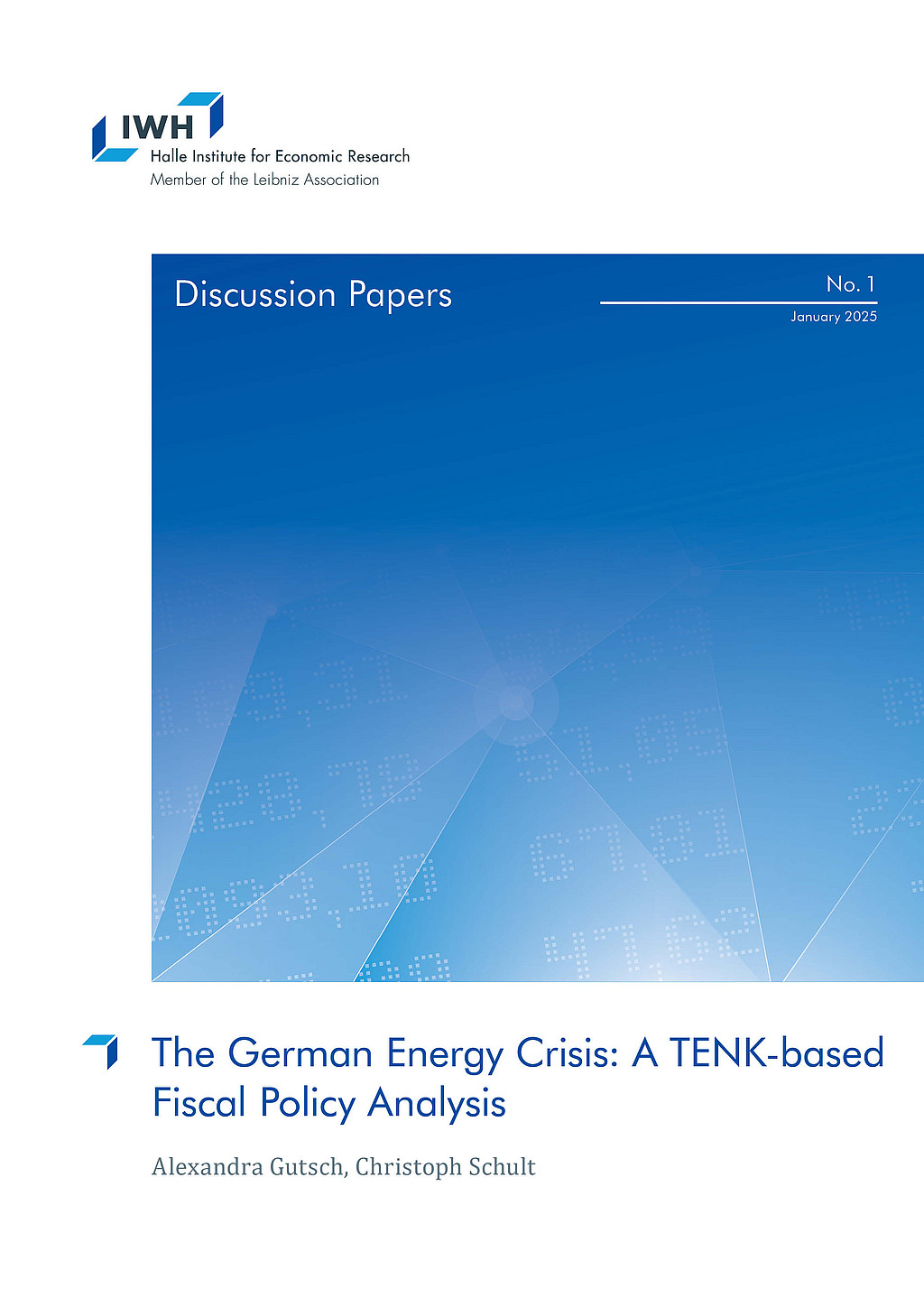
The German Energy Crisis: A TENK-based Fiscal Policy Analysis
in: IWH Discussion Papers, Nr. 1, 2025
Abstract
<p>We study the aggregate, distributional, and welfare effects of fiscal policy responses to Germany’s energy crisis using a novel Ten-Agents New-Keynesian (TENK) model. The energy crisis, compounded by the COVID-19 pandemic, led to sharp increases in energy prices, inflation, and significant consumption disparities across households. Our model, calibrated to Germany’s income and consumption distribution, evaluates key policy interventions, including untargeted and targeted transfers, a value-added tax cut, energy tax reductions, and an energy cost brake. We find that untargeted transfers had the largest short-term aggregate impact, while targeted transfers were most cost-effective in supporting lower-income households. Other instruments, as the prominent energy cost brake, yielded comparably limited welfare gains. These results highlight the importance of targeted fiscal measures in addressing distributional effects and stabilizing consumption during economic crises.</p>
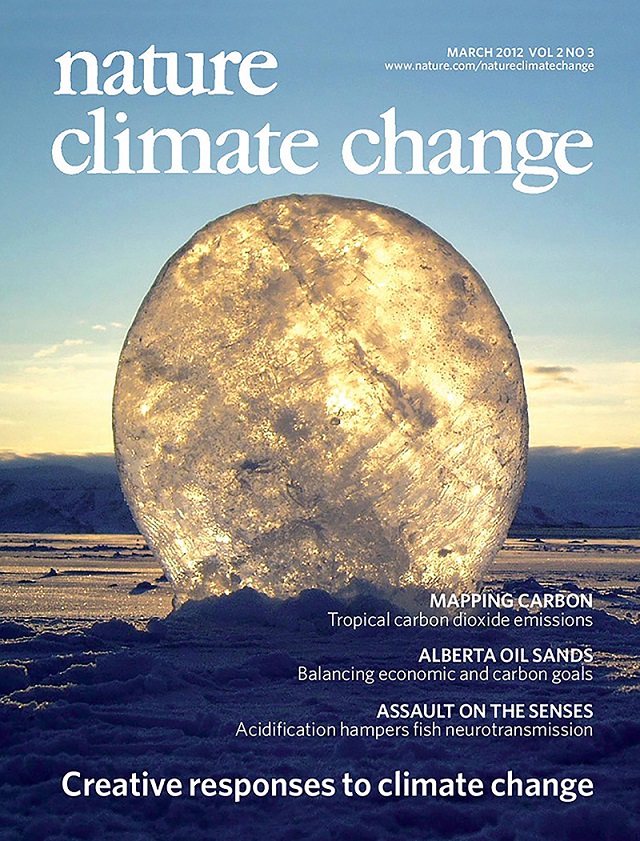
A Multi-Model Assessment of Inequality and Climate Change
in: Nature Climate Change, October 2024
Abstract
<p>Climate change and inequality are critical and interrelated defining issues for this century. Despite growing empirical evidence on the economic incidence of climate policies and impacts, mainstream model-based assessments are often silent on the interplay between climate change and economic inequality. For example, all the major model comparisons reviewed in IPCC neglect within-country inequalities. Here we fill this gap by presenting a model ensemble of eight large-scale Integrated Assessment Models belonging to different model paradigms and featuring economic heterogeneity. We study the distributional implications of Paris-aligned climate target of 1.5 degree and include different carbon revenue redistribution schemes. Moreover, we account for the economic inequalities resulting from residual and avoided climate impacts. We find that price-based climate policies without compensatory measures increase economic inequality in most countries and across models. However, revenue redistribution through equal per-capita transfers can offset this effect, leading to on average decrease in the Gini index by almost two points. When climate benefits are included, inequality is further reduced, but only in the long term. Around mid-century, the combination of dried-up carbon revenues and yet limited climate benefits leads to higher inequality under the Paris target than in the Reference scenario, indicating the need for further policy measures in the medium term.</p>



